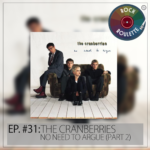
Episode 31 is here! The guys finish up their review of No Need to Argue, the 1994 #1 album by The Cranberries! How will the second half of this album fare? Also, the guys give a tribute to John Regan!
No Need to Argue is the second studio album by Irish alternative rock band the Cranberries, released on 3 October 1994. It is the band’s best-selling album and has sold 17 million copies worldwide as of 2014. It contains the band’s most successful single, “Zombie”. The album’s mood is darker and harsher than that on Everybody Else Is Doing It, So Why Can’t We? which was released a year before.
On 5 August 1995, Billboard stated that No Need to Argue was the largest seller of albums since its release, with 5.1 million copies sold in six months. On 10 March 1996, the Cranberries won a Juno Awards for Best-Selling Album. In 2009, No Need to Argue was ranked No. 90 on Billboard magazine: “300 Best-Selling Albums of All Time”. In July 2014, Guitar World placed No Need to Argue at No. 41 in their “Superunknown: 50 Iconic Albums That Defined 1994” list.
The Cranberries
Dolores O’Riordan – vocals, electric and acoustic guitars, keyboards
Noel Hogan – electric and acoustic guitars
Mike Hogan – bass guitar
Fergal Lawler – drums, percussion
Production
Stephen Street — producer
Intro Music by LiteSaturation from Pixabay
Photo by Andy Earl

Fair Use
* Copyright Disclaimer Under Section 107 of the Copyright Act 1976, allowance is made for "fair use" for purposes such as criticism, comment, news reporting, teaching, scholarship, and research. Fair use is a use permitted by copyright statute that might otherwise be infringing. Non-profit, educational, or personal use tips the balance in favor of fair use. No copyright infringement intended. ALL RIGHTS BELONG TO THEIR RESPECTIVE OWNERS
This is our musical reaction, breakdown, and commentary analysis of the song. We intend no copyright infringement, and this is not a replacement for listening to the artist's music. The content made available through this site is for educational and informational purposes only.
The site may contain copyrighted material owned by a third party, the use of which has not always been specifically authorized by the copyright owner. Notwithstanding a copyright owner’s rights under the Copyright Act, Section 107 of the Copyright Act allows limited use of copyrighted material without requiring permission from the rights holders, for purposes such as education, criticism, comment, news reporting, teaching, scholarship, and research. These so-called “fair uses” are permitted even if the use of the work would otherwise be infringing. *





